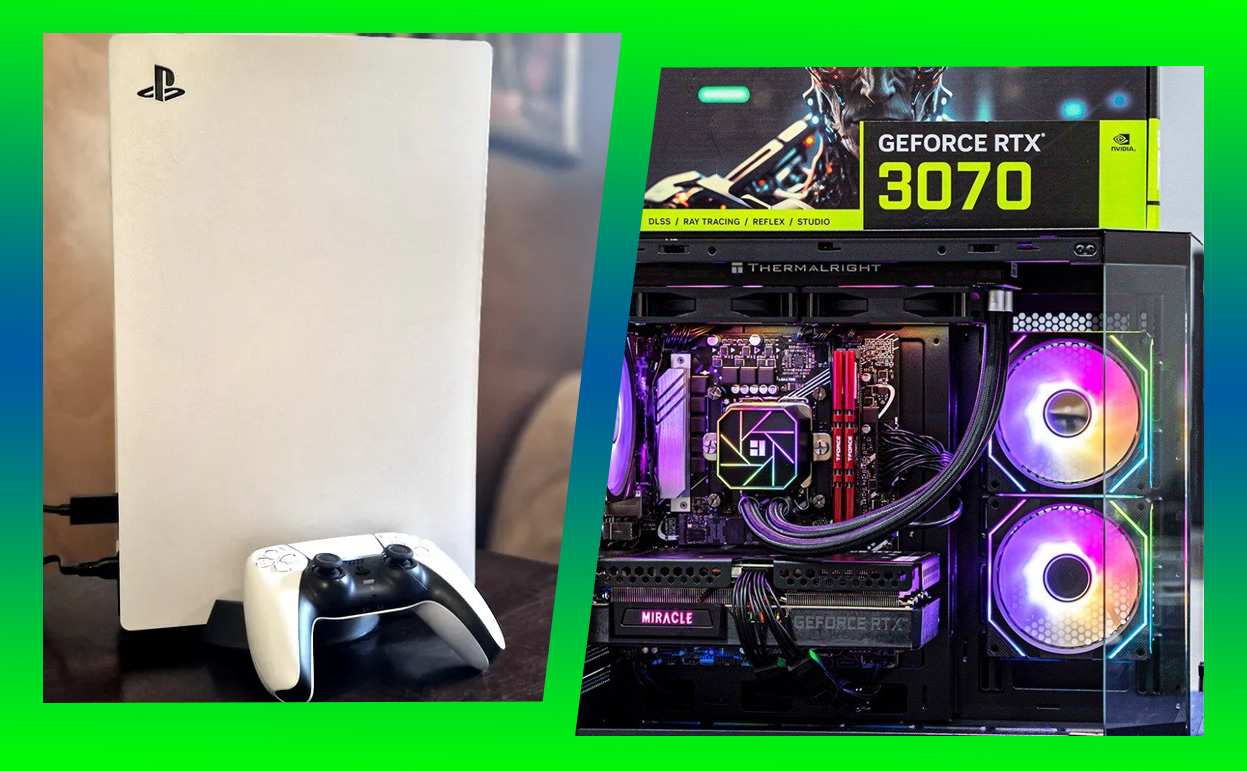Gaming enthusiasts face an ongoing debate: Is a high-end PC worth the investment over a PS5 Pro, or is Sony’s latest console upgrade enough? While both platforms offer immersive experiences, they differ significantly in performance, cost, game compatibility, and versatility. This article dives deep into each category to help you decide which option fits your gaming and entertainment needs.

Key Takeaways
| Factors | PS5 Pro | High-End PC |
|---|---|---|
| Graphics | Consistent, console-optimized | Superior, customizable with upgrade options |
| CPU & Processing | Fixed performance | Scalable with powerful CPUs like Ryzen 7000 series |
| Game Library | Exclusive titles | Broader library with mods and customization |
| Versatility | Limited to gaming & media | Multipurpose (gaming, productivity, editing) |
| Cost | Fixed upfront cost | Varies; potentially higher but upgradable |
| Longevity | Shorter without upgrades | Extended with upgrades |
Performance Comparison: Graphics, Speed, and Processing Power
Graphics and Frame Rates
Graphics power is crucial in gaming, and both PS5 Pro and high-end PCs deliver in this area, though differently. The PS5 Pro is equipped with custom RDNA graphics that are optimized for console gaming, providing a smooth, reliable frame rate on a set hardware configuration. Sony’s dedicated design allows games to run without the need for constant adjustments, and this consistency is a major plus for gamers who prefer simplicity.
High-end PCs, on the other hand, offer a wide array of GPU options, such as the NVIDIA RTX 4070 and AMD RX 7800 XT. These powerful GPUs can achieve higher frame rates, sometimes exceeding 120 FPS on high settings in games optimized for PC. Customizability is key here: PCs can adjust settings, allowing gamers to tweak resolution, shadow details, and other features, optimizing visuals based on personal preference.
“With PCs, the experience can be tailored to individual hardware, offering flexibility console gaming lacks.” – Windows Central
CPU and Processing Power
When it comes to processing power, the PS5 Pro’s CPU offers solid performance but remains limited to its fixed hardware specs. High-end gaming PCs frequently utilize powerful processors like AMD’s Ryzen 9 series or Intel’s 13th-generation i9 CPUs, allowing them to handle demanding AAA titles with ease. These processors support advanced multitasking capabilities, such as running background applications without impacting game performance, something consoles generally cannot match.
Storage and Load Times
Both platforms use SSD technology to minimize loading times. The PS5 Pro includes a PCIe 4.0 SSD, delivering quick load times and seamless transitions during gameplay. Meanwhile, high-end PCs often use PCIe Gen 5 SSDs, which boast faster data transfer rates, meaning less wait time for loading larger open-world games or resource-heavy files. For instance, upgrading to a 2TB NVMe SSD on a PC is easy and provides room for more game storage, whereas the PS5 Pro has limited options for internal expansion.
Price Comparison: Console vs PC Cost of Entry and Upgrades
Initial Purchase Price
The PS5 Pro offers a fixed cost with no need for additional upgrades—an advantage for gamers on a budget. The average price of a PS5 Pro sits at around $500–$600, providing an out-of-the-box gaming solution without extra investment. Comparatively, a high-end PC often ranges from $1,500 to $2,500 or more, depending on components.
| Component | Approximate Cost (PC) |
|---|---|
| CPU (Ryzen 9 7950X) | $700 |
| GPU (RTX 4070) | $600 |
| RAM (32GB) | $150 |
| SSD (1TB Gen 5) | $150 |
| Motherboard | $200 |
| Total | $1,800+ |
Long-Term Costs and Upgradability
One of PC gaming’s major strengths is upgradability. With a PC, users can replace individual components, such as the GPU or SSD, over time. This flexibility allows players to stay current with technology and extend their machine’s longevity.
In contrast, the PS5 Pro’s hardware is locked, limiting users to external upgrades like additional storage but leaving core components unchanged. If a gamer’s focus is on a long-term investment, PCs offer greater value by avoiding the need to buy a new console every few years.
Game Compatibility and Exclusive Titles
PS5 Exclusives and Console-Specific Titles
The PS5 Pro has a distinct advantage with exclusive games, such as God of War: Ragnarok, Spider-Man 2, and Horizon Forbidden West. Many console gamers prefer PlayStation because of these exclusives, which may not be available on PC until years later, if at all. PlayStation’s exclusivity appeals to those who enjoy AAA games right at release, particularly popular in competitive online communities.
PC Gaming Library and Backward Compatibility
Conversely, PCs provide a wider variety of games, including support for indie games and classics that may not be available on consoles. Backward compatibility on PCs is also virtually limitless, as PC players can access titles spanning decades with the right emulators and settings. Additionally, PCs allow modding options that enable customization of game mechanics, visuals, and user interfaces.
Flexibility: Uses Beyond Gaming
Multimedia and Productivity on PCs
High-end PCs serve a broader purpose beyond gaming, making them the go-to option for users who need a multipurpose machine. Beyond gaming, PCs support various productivity tasks such as video editing, graphic design, programming, and streaming, making them ideal for content creators. According to a survey from Statista, over 50% of PC users utilize their devices for both work and play, demonstrating the versatility of PCs compared to consoles.
Streaming and Media Capabilities on PS5 Pro
While the PS5 Pro offers media capabilities, it’s limited to streaming services and Blu-ray playback. Although this is convenient for entertainment, it cannot compare to a PC’s extensive range of applications for content creation, software like Photoshop, or even advanced 3D modeling software. The PS5 Pro is mainly a gaming device, while the PC is an all-encompassing media and productivity hub.
Ease of Use and Accessibility
Plug-and-Play Convenience of PS5 Pro
The PS5 Pro is plug-and-play, meaning it requires minimal setup. The operating system is specifically designed for gaming, providing quick access to games and media. This user-friendly experience is attractive to those who prefer a straightforward setup without needing technical knowledge.
Customization Options with PCs
PCs are inherently more customizable, supporting a wide range of peripherals, custom lighting, and ergonomic accessories. Gamers who enjoy personalizing their rigs will find that PCs offer endless customization possibilities. From RGB lighting to selecting custom graphics settings per game, the high-end PC provides greater control over the gaming experience.
Verdict: Which Option Suits You Best?
Ultimately, the PS5 Pro and high-end gaming PCs cater to different gaming preferences:
- Choose PS5 Pro if you value exclusive titles, consistent performance, and a budget-friendly entry point.
- Opt for a high-end PC if you prefer upgradability, high-performance graphics, and versatility beyond gaming.
Choosing between these options depends on whether you prioritize exclusive console games or the customization and multitasking capabilities of a PC. A high-end PC may require a larger initial investment, but its adaptability can justify the cost for avid gamers and tech enthusiasts.
Also Check:
- M4 Mac Mini Benchmarks: Which Mac Mini M4 Should You Buy
- How Many Monitors Can the M4 Mac Mini Connect to? Here’s What It Supports
- M4 Mac Mini Review: I Think it is Apple’s Best Compact Small Shell Computer…
- These Problems are Common With iPads, And Here is How to Fix Them
- When a Regular Wi-Fi Network isn’t Available Can Roku Connect to Hotspot? Yes, and…
